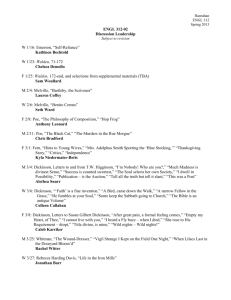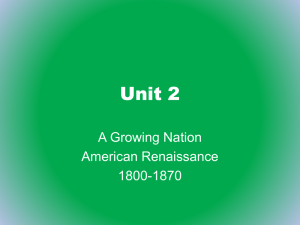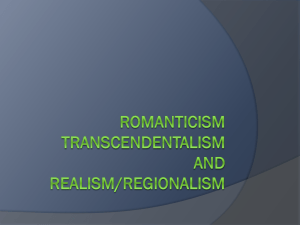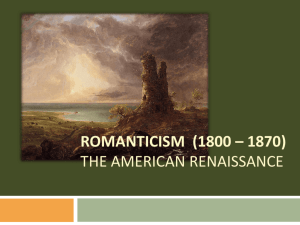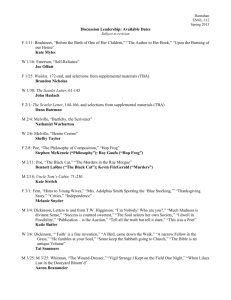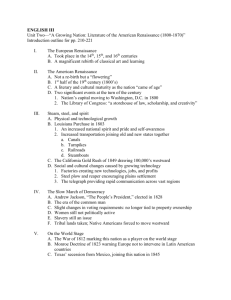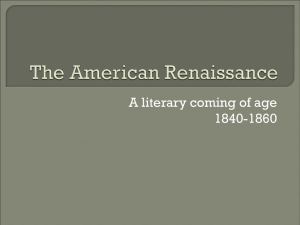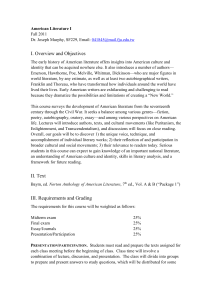314ss15 - Geneseo Wiki
advertisement
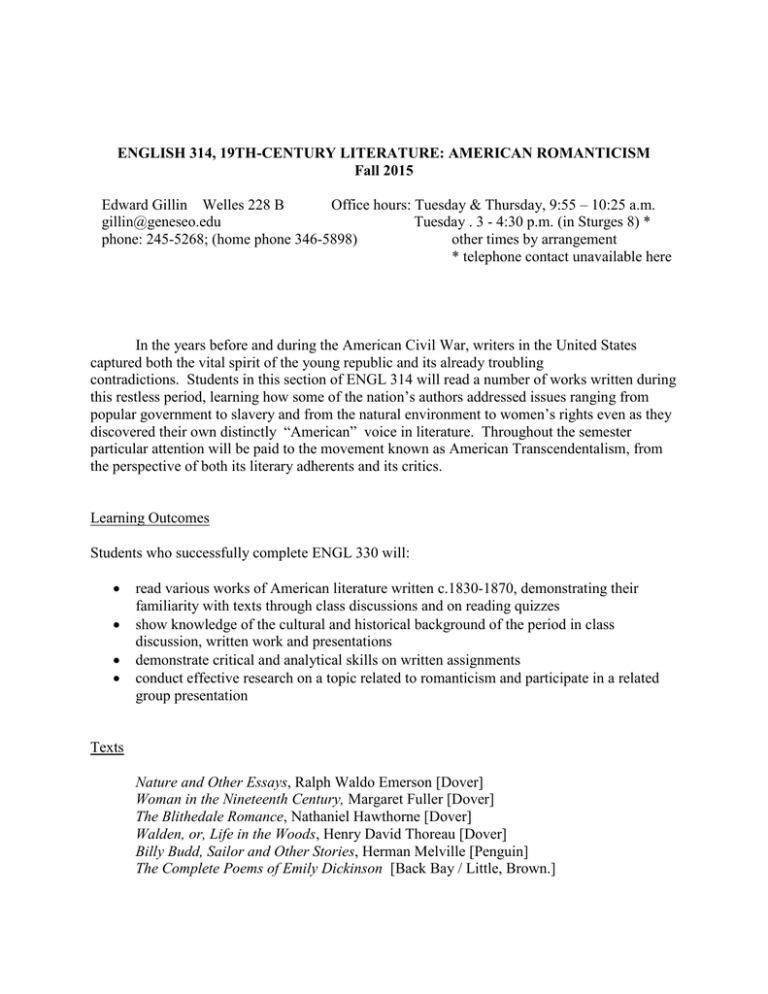
ENGLISH 314, 19TH-CENTURY LITERATURE: AMERICAN ROMANTICISM Fall 2015 Edward Gillin Welles 228 B Office hours: Tuesday & Thursday, 9:55 – 10:25 a.m. gillin@geneseo.edu Tuesday . 3 - 4:30 p.m. (in Sturges 8) * phone: 245-5268; (home phone 346-5898) other times by arrangement * telephone contact unavailable here In the years before and during the American Civil War, writers in the United States captured both the vital spirit of the young republic and its already troubling contradictions. Students in this section of ENGL 314 will read a number of works written during this restless period, learning how some of the nation’s authors addressed issues ranging from popular government to slavery and from the natural environment to women’s rights even as they discovered their own distinctly “American” voice in literature. Throughout the semester particular attention will be paid to the movement known as American Transcendentalism, from the perspective of both its literary adherents and its critics. Learning Outcomes Students who successfully complete ENGL 330 will: read various works of American literature written c.1830-1870, demonstrating their familiarity with texts through class discussions and on reading quizzes show knowledge of the cultural and historical background of the period in class discussion, written work and presentations demonstrate critical and analytical skills on written assignments conduct effective research on a topic related to romanticism and participate in a related group presentation Texts Nature and Other Essays, Ralph Waldo Emerson [Dover] Woman in the Nineteenth Century, Margaret Fuller [Dover] The Blithedale Romance, Nathaniel Hawthorne [Dover] Walden, or, Life in the Woods, Henry David Thoreau [Dover] Billy Budd, Sailor and Other Stories, Herman Melville [Penguin] The Complete Poems of Emily Dickinson [Back Bay / Little, Brown.] Grading and Procedures six reading quizzes critical paper class participation* presentation 30 % 35 % 15 % 20 % *Class participation involves demonstrated reading knowledge of all texts and regular contribution to classroom discussions. Deadlines for papers, class presentations and quizzes are firm. Late work may not be accepted for grading. Reading quizzes are unannounced and as a rule can’t be made up. ENGL 314 is generally based on active classroom discussion. Using laptops or handheld devices to surf the web, check email, twitter, or for any other purpose unrelated to coursework during class time may create serious distraction and is obviously unacceptable. Be advised, therefore, that inappropriate use of technology will put at risk your entire class-participation credit. Plagiarism (using the words or ideas of another without assigning proper credit to the original source) will be treated as a serious offense. It would most likely result in a failing grade for the course, as well as possible action by the College. Please talk to me about any doubts you have in this regard while conducting research or preparing your papers; it is always best to err on the side of caution. SUNY Geneseo will make reasonable accommodations for persons with documented physical, emotional, or cognitive disabilities. Accommodations will also be made for medical conditions related to pregnancy or parenting. Students who have consulted with the Director in the Office of Disability Services (Tabitha Buggie-Hunt, 105D Erwin) and determined their necessary accommodations should inform me early in the semester so that I can be prepared to be of assistance. Schedule of readings and discussions 1/20 1/22 Introduction. Romanticism and the United States American Transcendentalism. Emerson: Nature, Introduction & section I 1/27 1/29 Emerson: Nature, sections II-V Emerson: Nature, sections VI-VIII 2/3 2/5 Fuller, Woman in the Nineteenth Century, 1-33 Fuller, Woman in the Nineteenth Century, 33-61 2/10 2/12 Fuller, Woman in the Nineteenth Century, 61-98 Hawthorne: The Blithedale Romance, preface and chapters 1-7 2/17 2/19 Hawthorne: The Blithedale Romance, chapters 8-17 Hawthorne: The Blithedale Romance, chapters 18-29 2/24 2/26 Emerson: “The American Scholar” first presentation group 3/3 3/5 Thoreau: Walden, chapters 1-4 Thoreau: Walden, chapters 5-8 3/10 3/12 Thoreau: Walden, chapters 9-13 and “Conclusion” second presentation group spring break 3/24 3/26 Melville: “The Encantadas” Melville: “The Piazza” and “The Bell-Tower” 3/31 4/2 Melville: “Benito Cereno” Melville: “The Paradise of Bachelors and The Tartarus of Maids” 4/7 Dickinson: poems 214, 258, 311, 314, 328, 585, 764, 812, 875, 986, 1068, 1075, 1407, 1540, 1755 *** papers due*** Dickinson: poems 185, 225, 251, 320, 324, 325, 338, 428, 501, 946, 1017, 1052, 1545 4/9 4/14 4/16 Dickinson: poems 216, 241, 255, 276, 280, 281, 305, 341, 452, 465, 510, 650, 686, 712, 813, 1026, 1053 third presentation group 4/23 fourth group presentation 4/28 4/30 Dickinson: poems 49, 67, 199, 213, 245, 249, 250, 288, 303, 315, 435, 441, 448, 449, 709, 754, 1129 Dickinson: poetry (continuing discussions of previously assigned poetry) 5/5 fifth presentation group 5/8 12-3 p.m. [scheduled final period]: sixth presentation group Research project Formulate an interesting question about one of the authors or works assigned in ENGL 314 this semester. The question should be such that it cannot be answered on a simple factual basis, but demands some sources of information outside the original text for you to address it properly. Use your research skills to find the appropriate information (involving at least two print sources). Arrive at some thoughtful response to your question, expressed in a well written academic paper that employs standard MLA-style documentation. This paper is due on Tuesday, April 7. Presentation You will notice that six dates during the semester are designated for “presentations,” for which sign-up sheets will be circulated during the second week of classes. You’ll work with four classmates on your chosen day, guiding the class through a more intense exposition of some specific topic (under the broad heading of romanticism or the American 19th century) which has been addressed passingly or not at all during the semester. [Just for example, romantic types of art and romantic types of music were culturally significant in 19th-century America, but these related fields will not be specifically addressed in ENGL 314. However, your group may wish to provide everyone with a better background in, say, romantic art by means of a Power-point presentation, or a guided visit to one of the local institutions where such art may be viewed. And while the cooperation of an expert (such as an art historian willing to spend time with our class) would be valued, so would your group’s effort to establish particularly relevant connections between the sensibilities of artists and the sensibilities of writers we’re studying this semester.] Certainly many aspects of romanticism or the romantic era which we do point out in class—the influence of German philosophy, the American women’s rights movement, the agitation over slavery, developments in the American economy, the view of nature, etc.—may deserve the more comprehensive treatment which your group’s focus can provide. Any such topic may be chosen for further analysis. One element of this assignment deserves some emphasis. Anything that helps break down the four walls of the classroom—anything which gets us thinking about the connections between the literature of an older century and the world which we still inhabit—will be especially valued.
